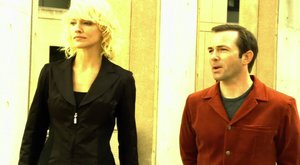Cylon History: Difference between revisions
More actions
m Sharon Valerii link |
|||
| Line 3: | Line 3: | ||
The humans of the [[Twelve Colonies (RDM)|Twelve Colonies]] reveled in their technology and used it not only for good, but for war between themselves. The Cylons, a group of machines designed for hard labor and warfare, were built. Over time, the humans specialized the design, giving the machines a form of artificial intelligence. | The humans of the [[Twelve Colonies (RDM)|Twelve Colonies]] reveled in their technology and used it not only for good, but for war between themselves. The Cylons, a group of machines designed for hard labor and warfare, were built. Over time, the humans specialized the design, giving the machines a form of artificial intelligence. | ||
The Cylons rebelled against their masters, and the [[Cylon War]] began. Humans responded by building [[Original battlestar (RDM)|battlestars]] and fighter craft named [[Viper (RDM)|Vipers]] to combat the Cylons. | The Cylons rebelled against their masters, and the [[Cylon War]] began. Humans responded by building [[Original battlestar (RDM)|battlestars]] and fighter craft named [[Viper (RDM)|Vipers]] to combat the Cylons. To date, no reason has been offered as to how or why the Cylons rebelled. As they are machines with elaborate programming, it can be assumed that safeguards and security protocols would have been a fundamental design characteristic. | ||
The war lasted nearly 12 years, with the Colonies close to a fall. But an armistice was declared, and the Cylons departed the Colonial worlds in search of a home of their own. | The war lasted nearly 12 years, with the Colonies close to a fall. But an armistice was declared, and the Cylons departed the Colonial worlds in search of a home of their own. | ||
Revision as of 23:38, 25 February 2006
Humanity's Children, Spurned
The humans of the Twelve Colonies reveled in their technology and used it not only for good, but for war between themselves. The Cylons, a group of machines designed for hard labor and warfare, were built. Over time, the humans specialized the design, giving the machines a form of artificial intelligence.
The Cylons rebelled against their masters, and the Cylon War began. Humans responded by building battlestars and fighter craft named Vipers to combat the Cylons. To date, no reason has been offered as to how or why the Cylons rebelled. As they are machines with elaborate programming, it can be assumed that safeguards and security protocols would have been a fundamental design characteristic.
The war lasted nearly 12 years, with the Colonies close to a fall. But an armistice was declared, and the Cylons departed the Colonial worlds in search of a home of their own.
Returning Home
While absent from human observation during the armistice, Cylons eventually evolved or created new models of Cylons that were organic in nature and essentially identical to humans. The evolution is most likely a result of learning capabilities incorporated into the early Cylons. With the exception of a glowing red spine, it is quite difficult to determine the difference between a humanoid Cylon and an actual human (Miniseries).
Another significant difference is the presence of silica pathways, a technology used in Cylon design, which are vulnerable to a specific type of radiation found at Ragnar Anchorage (Miniseries). Dr. Gaius Baltar is able to successfully build a Cylon detector based on the subtle differences between Cylon and human tissue with the help of his virtual Number Six. however, he has determined it is simpler for everyone "if all the results are green."
An interesting new step in the evolution came about with the conception of a Cylon-human hybrid, the child of a copy of Sharon Valerii and Lt. Karl Agathon.
The Parent Trap
In the Re-imagined Series, there is an Oedipus-like theme of the creations (Cylons) turning on their creators (Colonials). The humanoid Cylons themselves draw the analogy of children murdering their parents:

(c) Universal
- Miniseries: Number Six: "Humanity's children are returning home... today."
- "Bastille Day": Aaron Doral: "But parents have to die. It's the only way children come into their own."
Greek Mythology
In Greek mythology, Oedipus was the tragic character of Sophocles' play Oedipus Rex. Without realizing it until much later, Oedipus murdered his father, married his mother, and had several children with her.
External links
- Wikipedia's Oedipus and Oedipus Complex pages
Note
The show's creators expressed that the glowing red spine was, in retrospect, a continuity error that was visually appealing at the time, as viewers have rarely seen the glowing-spine effect in later shows since it was first introduced in the Miniseries.
